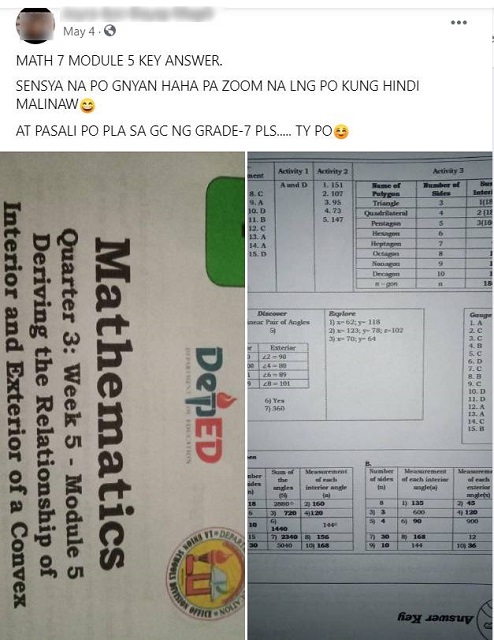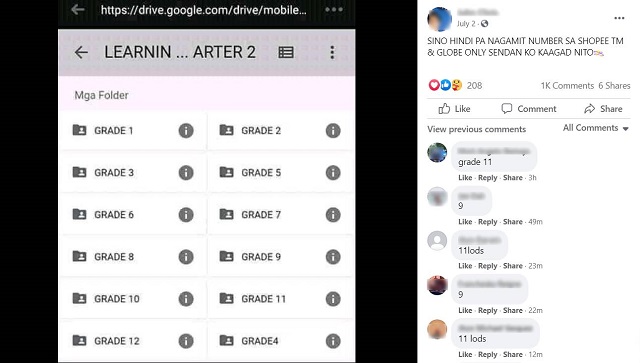-
Teachers are urging authorities to look into Facebook groups that have become havens for students to cheat, highlighting the many challenges the Philippines faces as one of the world’s last few holdouts for online learning during the pandemic.
Roma Amor Donato, a Grade 7 English and Media Arts teacher, said she was heartbroken after stumbling upon a public Facebook group named “Online Kopyahan.” To her dismay, it includes some of her students at Rizal High School in Pasig.
Facebook group of answer keys
Online Kopyahan, created in March 2021, is visible to anyone on Facebook. It has more than 660,000 members as of September 17, 2021.
“I even tried to look for similar pages last night and I found a lot of it. Imagine, kahit Grade 2 and Kinder modules kinokopya sa page?” Donato told reportr.
“Mind you, even posters, essays, graphs and frameworks for research were shared on that page,” she said.
Most of the posts were for Department of Education (DepEd) modules used in public schools. Localized DepEd modules, regardless of the subject and grade level, were also not spared.
 “Matalino ang mga bata, they even label posts sa page by region and by school,” says Roma Amor Donato, a Grade 7 English and Media Arts teacher.PHOTO BY courtesy of reportrADVERTISEMENT – CONTINUE READING BELOW
“Matalino ang mga bata, they even label posts sa page by region and by school,” says Roma Amor Donato, a Grade 7 English and Media Arts teacher.PHOTO BY courtesy of reportrADVERTISEMENT – CONTINUE READING BELOWWhile some members shared learning notes, others provided answer keys, claiming they were legitimate and correct.
A member who shared answers to a “Grade 10 English Quarter 1 Week 1-4” module defended her actions, saying, “I know everyone is having a hard time, so instead of competing, if we can, we must help each other hope it helps!”
How to stop online cheating
Bagbaguin National High School has warned its students already against joining the group, saying they will be reprimanded for their actions.
“Sinumang mag-aaral mula sa BNHS ang mapatunayang miyembro ng FB GROUP/PAGE na ito o mga katulad na group ay ipatatawag online sa Guidance and Counseling office,” it said.
Those who claim their Facebook accounts were hacked should immediately report it to authorities, the school said.
School officials called on parents to guide their kids in their studies at home, adding that the school has limited capacity to monitor every learner.
 One member of the Online Kopyahan FB group offered a Google Drive with answers to learning modules from Grade 1 to 12, as long as you pay. The post, which was dated July 2, received more than a thousand queries.PHOTO BY courtesy of reportrCONTINUE READING BELOWRecommended Videos
One member of the Online Kopyahan FB group offered a Google Drive with answers to learning modules from Grade 1 to 12, as long as you pay. The post, which was dated July 2, received more than a thousand queries.PHOTO BY courtesy of reportrCONTINUE READING BELOWRecommended VideosDonato and her fellow teachers reported the group and are coordinating how to address the students who joined the group for possible sanctions.
To minimize the sharing of answers online, she also opted to do subjective tests like reflection papers and portfolio-based assessments.
“Submitting just for the sake of complying to the subject isn’t learning at all…Cheating in all forms is still cheating regardless of the situation even pandemic. At the end of the day, nothing worth having comes easy. If you are looking for success without hard work, you are trying to harvest what you never planted,” she told students.
Jojo Asuncion, who teaches Grade 11 mathematics in San Jose Integrated School in San Luis, Pampanga, discouraged his students from joining Online Kopyahan or similar groups. He understands the struggles of distance learning, he said.
“Mas mainam na inunawa niyo ang mga ito at itinanong sa mga teachers nyo. Hindi kami after sa perfect score. Doon kami sa tamang pagkatuto niyo. Nandito ang mga teachers niyo na handang tumulong sa inyo,” he said in a Facebook post.
ADVERTISEMENT – CONTINUE READING BELOWResumption of face-to-face classes
For Donato, in-person classes are better than distance learning. “I am praying that the vaccine will be readily available to all. By that we can slowly go back to what we used to be,” she said.
UNICEF is advocating for a phased reopening of schools in the Philippines, especially in low-risk areas. The country is one of few countries in the world that has refused to reopen classrooms.
While schools in other countries were fully shut for an average of 79 teaching days, schools in the Philippines have been closed for more than a year, affecting the learning of more than 27 million students, UNICEF said.
The UN agency also underscored the effects of distance learning: poor learning environment with distractions at home, lack of support using technology, and lack of assets for remote learning.
ACT Teachers Party-list Rep. France Castro asked the DepEd for its plans for the safe reopening of schools next year, pointing out that in the 2022 proposed national budget, there was no concrete plan or steps to address it.
“The longer the Duterte administration keeps its schools closed, learning loss among students only continues to worsen. Another year of modules for students without adequate guidance from their teachers will be another wasted year for the students, teachers and parents,” Castro said.
Malacañang earlier said the government was studying how to safely reopen schools, starting with those in areas at low risk of COVID-19.
Read here about DepEd’s plan for face-to-face classes when allowed.
ADVERTISEMENT – CONTINUE READING BELOWThis story originally appeared on Reportr.World. Minor edits have been made by the SmartParenting.com.ph editors.
Teachers Are Upset Over Facebook Group That Encourages Students To Cheat
Source: Progress Pinas
0 Comments